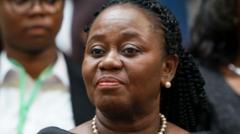What Led to the Removal of Ghana's Chief Justice Gertrude Torkornoo?

Published: 2025-09-02 13:01:08 | Category: world
Ghana's President John Mahama has dismissed Chief Justice Gertrude Torkornoo following an inquiry that substantiated allegations of misbehaviour against her. This significant decision marks the first time a sitting chief justice in Ghana has been removed from office, raising critical questions about judicial independence and the political landscape in the country.
Last updated: 30 October 2023 (BST)
Key Takeaways
- President John Mahama has fired Chief Justice Gertrude Torkornoo after an inquiry found grounds for misbehaviour.
- The chief justice had been suspended since April 2023 pending investigation.
- The decision marks the first dismissal of a sitting chief justice in Ghana's history.
- Torkornoo has labelled the allegations as unfounded and politically motivated.
- The inquiry reviewed extensive evidence from multiple witnesses.
The Inquiry and Its Findings
The inquiry into Chief Justice Gertrude Torkornoo commenced after complaints were filed against her by three individuals, prompting President Mahama to establish a five-member investigative committee. The panel meticulously reviewed approximately 10,000 pages of evidence and heard testimonies from 13 witnesses, including Torkornoo herself, who presented 12 additional witnesses, including experts. Ultimately, the committee concluded that there were valid grounds for Torkornoo's removal, as stated in the presidency's announcement.
Background on Chief Justice Torkornoo
Gertrude Torkornoo ascended to the position of chief justice in 2023, having been nominated by former President Nana Akufo-Addo. Notably, she is the third female chief justice in Ghana’s history. Her tenure has been marked by both significant achievements and controversies, including previous allegations of bias during her rulings when she served on the bench. Torkornoo had previously survived a removal request under Akufo-Addo after the petition was deemed to have "several deficiencies." This context adds layers to the current situation surrounding her dismissal.
Political Implications of the Dismissal
The removal of Torkornoo has sparked debate over judicial independence in Ghana. The opposition party, the New Patriotic Party, condemned her suspension earlier this year, labelling it as a politically motivated witch hunt aimed at undermining the judiciary. This sentiment has been echoed by critics like Alfred Tuah-Yeboah, a former deputy attorney general, who expressed concerns about the precedent set by her dismissal. He argued that the grounds for removal, as outlined in the inquiry, could endanger the future integrity of the judiciary.
Understanding Judicial Independence in Ghana
In Ghana, chief justices enjoy security of tenure, meaning they can only be removed under specific circumstances, such as incompetence or misbehaviour. The process to remove a chief justice typically involves a thorough investigation to ensure that the judiciary remains independent and free from political influence. The recent dismissal of Torkornoo raises questions about the robustness of these protections and the potential for political motivations to interfere with judicial processes.
What Happens Next?
The dismissal of Chief Justice Torkornoo may lead to significant changes within the Ghanaian judiciary. With her removal, the immediate question is who will succeed her. The appointment of a new chief justice will likely be scrutinised for signs of political influence, especially in light of the events surrounding Torkornoo's removal. Additionally, the two other petitions against her remain unresolved, suggesting that the inquiry's findings could still have implications for her legacy and the perception of justice in Ghana.
Public Reaction and Future Considerations
Public reaction to Torkornoo's dismissal has been mixed, with some viewing it as a necessary action to uphold accountability within the judiciary, while others see it as a troubling signal of encroachment on judicial independence. As Ghana navigates these challenges, the implications of this decision may resonate beyond the judiciary, affecting public trust in the rule of law and the political landscape.
Conclusion
The removal of Chief Justice Gertrude Torkornoo is a landmark event in Ghana’s legal history, highlighting the delicate balance between judicial independence and political influence. As the nation watches closely, the consequences of this dismissal will unfold, potentially shaping the future of Ghana's judiciary for years to come. What do you think this means for the future of judicial independence in Ghana?
#Ghana #JudicialIndependence #ChiefJustice
FAQs
What led to the dismissal of Chief Justice Gertrude Torkornoo?
Chief Justice Gertrude Torkornoo was dismissed following an inquiry that found grounds for misbehaviour based on evidence reviewed by a committee appointed by President John Mahama.
What is the significance of Torkornoo's removal?
Torkornoo's removal is significant as it marks the first time a sitting chief justice in Ghana has been dismissed, raising concerns about judicial independence and political interference.
How is judicial independence protected in Ghana?
Judicial independence in Ghana is protected by security of tenure for chief justices, allowing removal only under specific circumstances such as incompetence or misbehaviour, typically following a thorough investigation.
What has been the public reaction to the dismissal?
The public reaction has been mixed, with some supporting the decision as necessary for accountability and others expressing concern over potential political motivations and implications for judicial independence.
What happens next for the Ghanaian judiciary?
The Ghanaian judiciary will undergo changes with the appointment of a new chief justice, while unresolved petitions against Torkornoo may still influence public perception and judicial processes moving forward.



